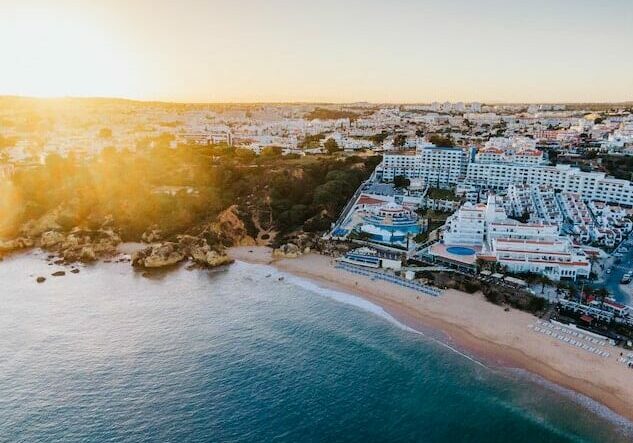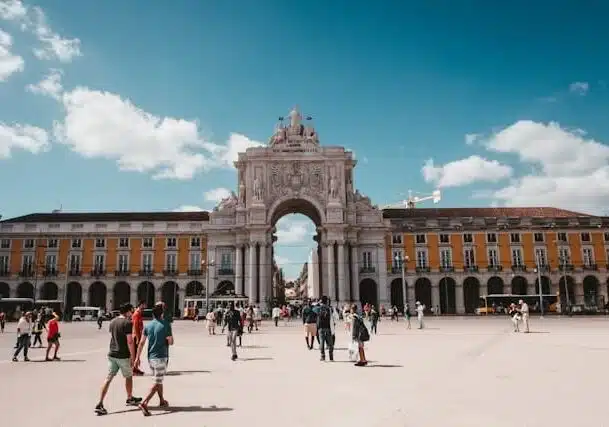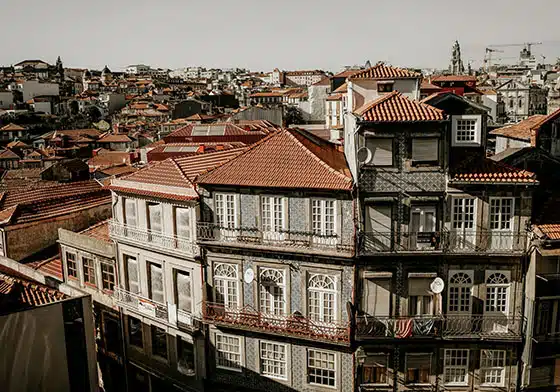Updated: February 6, 2026
Assisted living in Portugal allows retirees to enjoy a high quality of life, access top amenities, and benefit from excellent healthcare.
As a top global retirement destination in 2026, choosing to settle in Portugal offers a mild climate, a high quality of life, and a relaxed environment, with the D7 Visa offering an easy pathway for relocation for retirees.
Assisted living in Portugal offers a range of housing options, from luxury senior living communities with English-speaking care to more basic residential homes, often with a focus on integrating into the local culture and enjoying a comfortable lifestyle.
In this article, we provide insights into what assisted living is, why consider Portugal, the types of senior living options, and the best locations.
We’ll cover:
- The Portuguese Senior Living Market
- Why People Choose to Retire in Portugal
- How Assisted Living in Portugal Works
- Cost of Assisted Living in Portugal
- How to Choose the Right Assisted Living Facility
- Types of Housing Options Available
- Best Regions for Assisted Living in Portugal
- Find Your Perfect Home for Senior Living with Goldcrest
Quick Summary
- Assisted living in Portugal offers comprehensive support and personalized care.
- Portugal has been named as the best country to retire to in the 2025 Global Retirement Report.
- Monthly assisted living costs typically between €1,350 (interior areas) and €4,500+ (Lisbon area), depending on the level of care.
- Top locations include Lisbon, Cascais, the Algarve, and Comporta for English-speaking assisted living homes.
- Types of housing in Portugal for retirees include apartments, villas, and retirement homes.
What is senior living and assisted living?
Senior living: Senior living refers to housing and care options that are specifically designed to cater to the needs of older adults, usually over the age of 65, with assisted living requiring more hands-on support.
Assisted living: There is no one specific legal term for assisted living in Portugal. Assisted living is a type of senior living option where assistance is provided to residents to help them with daily tasks such as medication management and bathing, while also encouraging independence.
You will find a wide range of English-speaking assisted living homes dotted around the country, many of which provide personalized medical care to each resident to ensure all their needs are met.
Assisted living is focused on those who require help with their daily activities, with benefits including being part of a safe and supportive community, access to qualified medical care and assistance, and opportunities for socialization and community engagement.
There are two types of residential homes for the elderly in Portugal
Residential structures (homes)
Residential homes for the elderly are either temporary or permanent homes where residents are well-cared for and are open to persons over the age of 65 (those under 65 are considered on a case-by-case basis). Nursing care is provided.
Family care
Family care is provided for those over the age of 60 who require support and are intended for those who can no longer stay in their homes due to the absence of social and family support. Accommodation is provided in the home of a family member and can be either temporary or permanent.
You can find out more on the Portuguese Government website.
How to find official listings
To stay in a residential home or family care home, you can contact the home directly, the Carta Social (Social Charter), or the social security services in the area where you live.
On the Carta Social, you can easily find residential care homes. This is managed by the Ministry of Labour, Solidarity, and Social Security. You can find out more on their website.
You will also find social support for the elderly from the Portuguese government, including home help, community centers, and residential care.
Are there homes with English-speaking staff?
Yes, you’ll find senior living and assisted living homes with English-speaking staff, mostly situated in Lisbon and the Algarve. Communities in these areas tend to offer multilingual support. While public options are generally good, private options will have more English-speaking staff.
How to assess language services before choosing a facility
When assessing language services for assisted living in Portugal, it is best to visit the homes, confirm staff fluency, check the availability of English-speaking doctors, and see firsthand whether other residents speak English and whether it could be a good fit overall.
Other Types of Senior Living Options in Portugal
Alongside assisted living homes, there are many different types of retirement homes and accommodation options for elderly people in Portugal. Below, we provide information on some of the common options for those retiring in Portugal and seeking a retirement home.
 Independent living communities
Independent living communities
You’ll find an array of independent senior living communities in Portugal, where elderly residents are part of a community, but usually have their own independent living apartments or units. They will also have communal amenities, such as a shared swimming pool, fitness center, and so on.
This form of retirement community is perfect for a maintenance-free lifestyle.
 Specialized care options
Specialized care options
Alongside independent living communities, you will find specific senior homes catering to a range of needs, such as:
- Memory care facilities and dementia units for those with Alzheimer’s or dementia
- Rehabilitation services
- Nursing homes with facilities providing 24/7 medical care
- Skilled nursing care for those with more complex health needs
- Continuing Care Retirement Communities (CCRCs) for a full range of care levels
- Hybrid hospitality-care facilities, mixing assisted living with a tourism-style service (becoming more common)
The Portuguese Senior Living Market
The Portuguese senior living market is experiencing growing interest from investors and retirees, driven by an aging population and the need for more senior residences.
The market offers opportunities for various residential options, from independent living to assisted care homes, and is attracting attention for its potential for high returns and a good quality of life.
In Portugal, people are now living longer and healthier lives, with life expectancy standing at 82.5 years of life. At the same time, Portugal faces a shortage of senior living facilities, creating a high-demand market.
Why People Choose to Retire in Portugal
If you are looking for a place to retire, you’ll want to have peace of mind that you’re choosing the best option for you. These are your days to unwind and relax and to make the most of this stage of your life. Your golden years should be enjoyed to the fullest.
There is an array of reasons to consider retiring to Portugal, from the welcoming Portuguese people to the country’s jaw-dropping natural beauty.
According to the 2025 Global Retirement Report, Portugal is regarded as the best country to retire in the world. Portugal provides an array of qualities to boost the quality of life for retirees, ensuring they can enjoy the activities and infrastructure that allow them to live their best lives.
Below, we focus on some of the key reasons why more retirees than ever before are making the leap to embrace a new culture for their golden years and why Portugal holds all the cards when it comes to the top locations to retire to.
 Portugal becoming a Blue Zone for retirees
Portugal becoming a Blue Zone for retirees
Portugal is a safe, stable country with ample sun, good food, and a Mediterranean lifestyle that is perfect for retirees. With an average life expectancy of 82.5 years in 2025, Portugal has even been in discussions about being a new blue zone, which are specific areas across the globe that are pinpointed as providing exceptionally long lives to their population.
This status is owed to a combination of physical activities, rich social interactions, low levels of stress, healthy diets (a focus on fresh fish, fruit, vegetables, and healthy oils), and low disease incidence.
The climate in Portugal certainly helps, with the possibility of enjoying the great outdoors and stunning landscapes throughout the year. Plus, the close-knit community culture of the Portuguese is infectious, and you’ll quickly be able to form a close circle of friends here.
 Healthcare quality and accessibility
Healthcare quality and accessibility
Portugal offers a high-quality healthcare system, with both public and private healthcare options. Public healthcare is covered under the National Health Service, known as the SNS, and is free for residents over the age of 65. The coverage is extensive, with there being more than 240 hospitals in the country.
Those seeking private options may be pleasantly surprised by the cost of private healthcare, particularly when you compare private healthcare plans with those in the USA.
The excellent quality and easy access to healthcare may be a reason why Portugal has a high life expectancy, according to the World Health Organization.
 Cost of Living in Portugal
Cost of Living in Portugal
The low cost of living in Portugal is one of the key reasons why so many expats relocate to Portugal. From weekly groceries to property prices, most things are quite affordable compared to other Western European countries and the USA.
Take private healthcare, for example, where the average cost of private health insurance usually falls between €400 and €800 per year, whereas, in the US, annual premiums can set you back thousands of dollars.
 Safety and low crime rates
Safety and low crime rates
Portugal is widely regarded as one of the safest countries in Europe. According to the 2025 Global Peace Index, it ranks as the 7th safest country in the world.
Known for its low crime rates, Portugal offers a strong sense of security, particularly appealing to retirees.
 English proficiency
English proficiency
Many Portuguese, especially in cities and tourist areas, speak English well, making daily life easier for retirees. Portugal ranks highly for English proficiency, placing sixth globally in the 2025 EF English Proficiency Index.
This strong language ability helps newcomers feel more comfortable and connected.
 Additional benefits of senior living communities in Portugal
Additional benefits of senior living communities in Portugal
Living as part of a senior care community also comes with added benefits, such as:
- Continuum of care: Access to various levels of support within the same community, allowing seamless transitions as your needs change
- Peace of mind: On-site care services reduce the stress of future healthcare planning for residents and their families.
- Social connection: Social and recreational activities combat isolation and encourage a vibrant, active lifestyle.
- Maintenance-free living: Services like housekeeping, landscaping, and repairs free residents from the burdens of home maintenance.
- Resort-style amenities: Access to fitness centers, pools, golfing, dining venues, and cultural events.
- Strong community: Residents often develop lasting bonds with each other and the staff, creating a warm, supportive environment.
How Assisted Living in Portugal Works
Senior and assisted living resorts in Portugal typically offer two main residency options. The life right (or life lease) allows residents to pay a one-time or monthly fee for the exclusive right to live in a chosen apartment for life.
Alternatively, some communities offer freehold property ownership, giving buyers full ownership of their home within the resort.
What is usually included in assisted living?
Monthly fees cover a comprehensive range of services designed for comfort, safety, and well-being. These include:
- Accomodation
- Daily meals to fit your dietary requirements
- 24/7 on-hand nursing
- Regular medical checks from a GP
- Cleaning services, laundry, and personal bathing/dressing (if required)
- Community and social leisure programs
Meals of the meals feature traditional Portuguese, Mediterranean, or some international cuisine, and accommodate special dietary needs.
Optional extras
Additional services typically offered at assisted living facilities, but may not be included in the fees, include:
- Private doctor visits
- Occupational therapy, or memory care
- Medications and lab tests
- Additional or specialized physiotherapy
- Massage and chiropody services
- Extra medical care and medical support, or nurse/carer escorts
- Ambulance transport for outpatient care
- Hair salon, spa, and beautician services
- Private gym sessions
- Extra guest meals
- Taxis and private excursions
Cost of Assisted Living in Portugal
The cost of assisted living in Portugal for seniors can range from a monthly fee of between €1,350 and €4,500+, with your costs greatly dependent on the level of daily care and assistance you will need.
You can find affordable assisted living in Portugal’s interior areas, though English is not as widely spoken.
Location | Average monthly cost | Information |
Lisbon & Cascais | €2,000 – €4,500+ | Highest demand, with premium options in Cascais costing more than €5,000 |
Algarve | €1,900 – €4,000 | Prime homes with mild climate and proximity to stunning beaches and high quality of life |
Porto | €1,800 – €3,500 | High quality care homes, although English not as widely spoken as in Lisbon and the Algarve |
Center/interior | €1,350 – €2,000 | Towns like Viseu or Santarém offer the best value but English is not widely spoken for internaitonal retirees |
Retirement homes that offer a more hands-on approach or round-the-clock assisted living services will cost more, with luxury care homes in Portugal being in a higher price bracket.
How to Choose the Right Assisted Living Facility
To make the right decision on an assisted living facility in Portugal, evaluate the level of care, how friendly the staff are, and consider factors such as location, cost, and amenities. Most importantly, picture if you can see yourself living there and being happy to enjoy your golden years.
Make sure to thoroughly research the home, including combing through reviews and asking detailed questions about the level of care, staff training, access to healthcare, and services. Make a list beforehand of questions you may have, and go through each point with the retirement home. If possible, also speak with current residents to see how they feel about the facility.
Types of Housing Options Available
Portugal offers various housing options, including apartments, villas, townhouses, country houses, and traditional farmhouses.
Apartments
- The most common housing option in Portuguese cities, apartment types range from studio apartments (T0) to multi-bedroom apartments (T1, T2, T3, etc.)
- Many apartments have been renovated and now have modern interiors
- For older apartments, make sure that the property is well-insulated
Villas
- Villas are often spacious, luxury properties that you will find particularly in coastal regions such as the Algarve
- Many have private swimming pools, gyms, and private gardens
- Villas with sea views will push up the price
Best Regions for Assisted Living in Portugal
Portugal has an array of spectacular locations, and choosing the right spot to retire to will depend completely on your personal preferences. Below, we detail some of the top contenders when it comes to enjoying your golden years to the fullest.
Note that this list of the best places for retirement living in Portugal is by no means exhaustive. You will find top retirement spots across the country, from the Douro region in the north, with the most spectacular landscapes in Portugal, to the autonomous islands of Madeira and the Azores, for unrivalled ocean vistas.
Algarve
 The Algarve has long been a favorite with retirees, with its unrivaled coastline, mild climate in which to enjoy outdoor activities throughout the year, and strong expat community.
The Algarve has long been a favorite with retirees, with its unrivaled coastline, mild climate in which to enjoy outdoor activities throughout the year, and strong expat community.
This breathtaking destination regularly tops charts of the best regions to retire to – and with good reason. In many ways, the Algarve is geared to expats and retirees, with English widely spoken, excellent healthcare services, and several senior homes to cater to retirees.
You’ll find several excellent senior living communities in Portugal, and many of these are situated in the Algarve.
Monte da Palhagueira has elevated luxury retirement living to new heights and is located close to the romantic and historic town of Alte. Monte da Palhaguiera is one of the best English-speaking care homes in Portugal. The estate is surrounded by sun-dappled hills and is within 20 minutes of Faro Airport. It also has the only consecrated Anglican church in the area.
You can find out more about the spectacular Algarve region in our article on Algarve Portugal real estate.
Comporta – the Hamptons of Europe
 If you are seeking elegant luxury retirement living, then look no further than Comporta, situated a short distance to the south of Lisbon. Affectionately known as the “Hamptons of Europe”, Comporta is one of the stand-out luxury destinations in Portugal.
If you are seeking elegant luxury retirement living, then look no further than Comporta, situated a short distance to the south of Lisbon. Affectionately known as the “Hamptons of Europe”, Comporta is one of the stand-out luxury destinations in Portugal.
Here, you have the infamous Cork Tree Residen in Comporta, a groundbreaking sanctuary.
Cork Tree Residences offers a vibrant, elegant lifestyle to residents with upscale amenities that are focused on independent living but that retain a sense of community.
For an overview of Comporta and its vibrant property market, you can check out our article on Comporta real estate.
Lisbon
 While the Algarve and Comporta in the southwest of Portugal are top choices for those seeking retirement living by the coast, those looking to be close to a vibrant city may have Lisbon in their sights.
While the Algarve and Comporta in the southwest of Portugal are top choices for those seeking retirement living by the coast, those looking to be close to a vibrant city may have Lisbon in their sights.
Lisbon is the perfect balance between tradition and modernity, combining rich cultural experiences with state-of-the-art amenities. You are also within striking distance of beautiful beaches, excellent healthcare, and essential services and amenities.
One of the best senior homes close to Lisbon is Life Plan Resorts. At Life Plan Resorts, you’ll have an array of activities on offer – 100 activities in total, from tennis to golf – and you’ll feel part of the community very easily, with rehabilitation, pet spas, and a fine dining restaurant serving up exceptional food. There is also an excellent hotel for family visits to maintain strong family bonds.
If you are looking to retire in one of the most beautiful capitals in Europe, Lisbon can deliver. If you are seeking options, consider assisted living in Lisbon, Portugal, where you’ll have several options. You should have no problems finding world-class retirement homes in Lisbon, Portugal.
Porto
 Porto, the second largest city in the country, located in the north, is also a top contender, where retirees will enjoy a slightly milder climate, beautiful parks, and a historic charm unlike anywhere else in the country.
Porto, the second largest city in the country, located in the north, is also a top contender, where retirees will enjoy a slightly milder climate, beautiful parks, and a historic charm unlike anywhere else in the country.
Both Lisbon and Porto have all the facilities needed for healthy seniors and have some of the best retirement villages in Portugal close to them. If you are on the hunt for a fine dining restaurant or want to enjoy a museum or art gallery, then living in close proximity to a bustling city means that there is always something to get involved in.
Access to leading golf courses, water sports, and other activities, such as hiking and yoga, is also a key reason why more retirees than ever before are seeking out retirement living options in Portugal’s two biggest cities.
Conclusion - Why Assisted Living in Portugal is a Great Choice for Your Retirement
Assisted living in Portugal offers a lower cost of living, high-quality healthcare (Portugal ranks as having the 23rd best healthcare in the world), and a welcoming atmosphere.
Assisted living homes can be found in Lisbon and the Algarve, amongst other locations, with many offering 24/7 assistance, activities for retirees, and where English is widely spoken.
The country’s mild climate and healthy Mediterranean cuisine add to its appeal, making it an attractive option for retirees seeking a comfortable place to live. These factors have contributed to Portugal being crowned as the number one retirement destination in the 2025 Global Retirement Report.
Find Your Perfect Home for Senior Living with Goldcrest
At Goldcrest, we specialize in the Portuguese property market, giving you the benefit of deep local expertise and access to the best insights and opportunities for buying or renting senior living property in Portugal.
We offer a fully integrated service that goes beyond property search, guiding you through every step of the process to help you settle into your new home.
Our approach is transparent and client-focused. We recommend only what’s in your best interest, drawing on extensive experience to save you time and money. Contact our team today to see how we can make your journey simpler.
Frequently Asked Questions about Assisted Living in Portugal
What is senior living in Portugal?
Senior living in Portugal includes various housing options designed for retirees, offering comfortable accommodations, social opportunities, and access to healthcare services. Senior living refers to communities that cater to individuals seeking active, assisted, or independent lifestyles. There are also several senior assisted living Portugal care home options.
What is the minimum age for senior living communities in Portugal?
The minimum age to be part of senior living communities in Portugal is typically 55, depending on the community’s rules. Some senior living communities may allow younger spouses or dependents to reside in residential homes as well.
What are the best regions for senior living in Portugal?
Popular regions include the Algarve for its climate and relaxed pace of life, Lisbon for its amenities and vibrant lifestyle, and Porto for its cultural vibrancy. Comporta is also a top location, for those looking to retire in style and peace.
What types of retirement communities are available in Portugal?
You’ll find a wide selection of Portugal retirement communities. Options include independent living, assisted living, continuing care communities, and private institutions. Some cater specifically to expats or offer specialized support services for medical or memory care needs. Many will have qualified medical assistance and medical professionals on hand.
What legal requirements do I need to meet to retire in Portugal?
If you are a non-EU national, you will need to secure a residency visa to relocate to Portugal. The Portugal D7 Visa (also known as the retirement visa or passive income visa) is a good option for retirees seeking a Portuguese residency permit.
For the D7 Visa, you will need to show proof of sufficient income (€920 per month). After arriving in Portugal, you will need to attend an appointment with AIMA to get your residence permit.
The Portugal Golden Visa is another option to consider. For the Portugal Golden Visa, you will need to make a minimum investment of €250,000.
Can I rent a property in senior living communities?
Yes, renting is a common option in senior living communities, offering flexibility and lower upfront costs compared to purchasing. Buying property in Portugal can, however, be a smart investment option.
What assisted living services are available in Portugal?
Assisted living services often include personal care, meal preparation, medication management, and transportation tailored to individual needs. This will depend on the senior living options you opt for.
How easy is it to integrate into the local Portuguese community?
Many expats now live in Portugal, but fully integrating into the local community requires immersing yourself in Portuguese culture and the way of life. Making an effort to speak the Portuguese language goes a long way as a first basic step toward integration (even if most locals will have an excellent command of English).
What is a life lease in Portuguese retirement homes, and how does it work?
Some homes in Portugal also offer a life lease, or life rights, to residents. A life lease allows the buyer the right to live in the property or unit for their lifetime and is an alternative to traditional homeownership or renting a property. Other homes may have the option of freehold property acquisition, where individuals have the opportunity to acquire a freehold property within the retirement community.
How does the Portuguese assisted living system care for the elderly?
Assisted living and nursing homes are available to the elderly in Portugal for higher-level care. The public healthcare system (SNS) offers access to medical care, while social services, including the National Network for Integrated Continuous Care (RNCCI), provide a range of support services. Families and informal caregivers also play a crucial role, particularly in providing home-based care.
How much does assisted living cost in Portugal?
Monthly assisted living costs typically between €1,350 and €4,500+, depending on the level of care required.
Does Portugal have assisted living facilities?
Yes, Portugal has well-developed assisted living and nursing facilities. They are mostly located in Lisbon and the Algarve. You’ll find 24-level support, memory care, and rehabilitation.
How can I find assisted living in Portugal for sale?
Finding assisted living properties in Portugal for sale involves online research and working with real estate specialists to find this specific type of real estate. Assisted living in Portugal for rent costs residents between €1,350 and €4,500+, meaning there is quite a high return on investment (ROI).